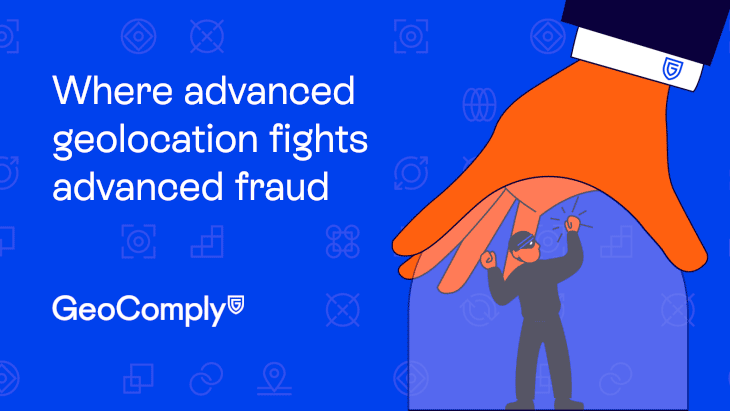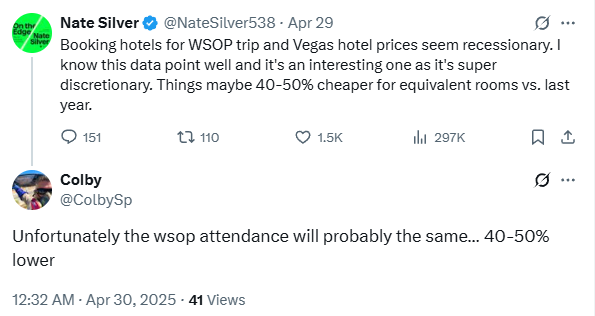You Do You
The four types of sports betting: Traditional (value-driven), SGP (thrill-seeking), In-Game/Prediction (real-time), and DFS (strategic). Each targets unique user motivations.
CFTC asks court to dismiss election betting appeal, Sports betting categories, legislative updates, new WSOP policies include a cellphone ban, and more.
The Bulletin Board
THE LEDE: Are there now four distinct sports betting categories?
ROUNDUP: Florida bills advance and die; Fanatics new iCasino app; IL’s Dave & Buster’s bill; Quote of the Week.
NEWS: WSOP 2025 updates including new rules and online registration.
AROUND the WATERCOOLER: CFTC asks court to dismiss its election betting appeal against Kalshi.
STRAY THOUGHTS: Difficult decisions (and more quotes).
Sponsor’s Message: Increase Operator Margins with EDGE Boost Today!
EDGE Boost is the first dedicated bank account for bettors.
Increase Cash Access: On/Offline with $250k/day debit limits
No Integration or Costs: Compatible today with all operators via VISA debit rails
Incremental Non-Gaming Revenue: Up to 1% operator rebate on transactions
Lower Costs: Increase debit throughput to reduce costs against ACH/Wallets
Eliminate Chargebacks and Disputes
Eliminate Debit Declines
Built-in Responsible Gaming tools
To learn more, contact Matthew Cullen, Chief Strategy Officer, Matthew@edgemarkets.io
The Lede: Diverging Sports Betting Categories
With $100 billion wagered annually, sports betting isn’t one-size-fits-all.
For several months, I’ve been highlighting my belief that the term sports betting is no longer a useful catchall. My argument has been that there are now two distinct sports betting categories:
Low-hold, traditional pre-game and prop markets
High-hold, lottery-esque SGP markets
Missing from this is in-game betting, which I had viewed as overlapping with both.
However, the rise of prediction markets has me reconsidering whether there are two or three (and as I’ll explain in a moment, possibly four) sports betting categories.
Separating in-game betting and combining it with prediction markets as a single category makes sense to me. I’ve repeatedly mentioned in the newsletter and on my podcast how Kalshi’s graph tracking of odds seems like an intuitive way for people to track potential outcomes. In-game betting and Kalshi’s UX go together like peas and carrots, as there is a tech synergy that simply works.
That puts us at three distinct sports betting categories:
Traditional: Analytical, value-driven betting.
SGP: Casual, high-excitement wagering.
In-Game/Prediction: Real-time, speculative engagement.
But as I noted above, there’s also a fourth category:
Daily Fantasy Sports: Strategic, roster-based peer-to-peer competition.
DFS, especially the newer versions, aren’t just another pre-game prop bet. Its roster-building, player-vs-player competition, and skill-based appeal create a unique experience. Building a lineup, balancing star players with sleepers under a salary cap, feels like running a team. Its player-vs-player format and skill-based appeal set it apart from traditional betting, blending strategy and community in a way traditional betting can’t.
This four-market framework targets distinct user motivations. Further, as tech continues to improve (pushing the boundaries of what is possible) and regulations shift, expect these categories to redefine how we bet.
Yes, it’s all sports betting, but the motivations and appeal are becoming more compartmentalized.
Roundup: Florida Bills; Fanatics iCasino App; IL’s Dave & Buster’s Bill; Quote of the Week
Florida lobbying bill amended to add DFS; passes House [Casino Reports]: A Florida bill, HB 1467, would increase “the amount of time a former member of the Florida Gaming Control Commission (FGCC) must wait before joining fantasy sports or sports betting companies,” has passed the House and is on its way to the Senate. The bill was amended to include clear definitions and state regulation of DFS.
Florida is the fourth state to say no to sweepstakes ban [Sports Betting Dime]: So far, only Montana has passed legislation prohibiting sweepstakes, as Florida joins Arkansas, Maryland, and Mississippi, where bills have not passed the legislature — several other states do have active legislation (STTP’s list can be found here). Per SBD: “SB 1404, a piece of legislation that includes a prohibition on sweepstakes gaming in the state, and its House counterpart HB 1467, will no longer be considered. Simon’s bill successfully moved through two Senate committees, but did not find itself in a list of eligible bills to be considered during the session extension.”
Fanatics launches standalone online casino app [SBC Americas]: Fanatics unveiled its standalone online casino app last week in four states: Michigan, New Jersey, Pennsylvania, and West Virginia. According to research from Eilers & Krejcik Gaming (a newsletter sponsor), Fanatics has been steadily growing its market share on the sports betting (4th in handle and GGR) and online casino (6th, and closing in on Caesars and BetMGM) fronts. As EKG recently noted in its sports betting market monitor ($$$), “Fanatics’ rise jumps off the page, with the brand in full-on acquisition mode judging by punchy handle and GGR share growth, aggro promo ratios, and low net hold margins.”
Illinois Dave & Buster’s bill advances out of committee [NBC Chicago]: “An Illinois bill that would prohibit Dave & Busters customers from wagering in the company’s app passed a Senate committee this week… House Bill 2724 passed out of the Senate Executive Committee on Wednesday, marking a step toward prohibiting the company from offering wagering services in its arcades.” Previous STTP coverage on Dave & Buster’s efforts to allow “friendly” wagers on arcade games.
Quote of the Week [InGame]: “They’re filing in the right court, but there are all sorts of problems with this complaint. This is the lawsuit West Flagler should have filed at the very beginning instead of going around from federal court to federal court.” NOVA Southeastern Constitutional Law Professor Bob Jarvis on the new lawsuit challenging Florida’s 2021 gaming compact
SPONSOR’S MESSAGE: GeoComply: Where advanced geolocation fights advanced fraud.
Gone are the days when detecting IP spoofs and blocking VPN use is enough to tick the “fraud prevention” box. Not when cybercriminals are using state-of-the-art tech and stolen identities to exploit iGaming operators through bonus abuse and fraudulent chargebacks (often to the tune of six to seven figures a month).
These aggressive attacks require forceful solutions. GeoComply’s Risk Research and Data Science teams have been using machine learning and adaptive intelligence to identify fraudsters masquerading as “real” players, immobilizing them before they can get away with stolen funds.
Ready to dismantle the fraudsters' playbook? GeoComply gives you the tools to stop them—all without having to onboard a new vendor or disrupting your legitimate players.
Visit the GeoComply booth (#D445) at SBC Summit Americas next week, or book a demo to schedule a deep dive.
News: WSOP 2025 Updates
The 2025 World Series of Poker is just three weeks away, and the WSOP has just unveiled another batch of new rules, including prohibiting cell phones when tournaments reach the final three tables and at featured or streaming tables.
Per reporting from Pokerfuse.com:
“Once a tournament reaches its final three tables, all electronic devices must be completely removed from the table and are strictly prohibited from use, a policy already adopted by Wynn and one that PokerStars is considering for its live events. Failure to comply ‘will result in penalties up to and including disqualification.’”
Another policy change, made necessary following last year’s controversial final table, when eventual champion Jonathan Tamayo would visit his rail and get advice and information from computer programs they were running.
“The new rules also prohibit both players and spectators from using charts, apps, artificial intelligence, or any other form of electronic assistance that could provide a competitive advantage… Organizers have made it clear that the use or possession of devices, software, or hardware to gain an advantage in the tournament is strictly prohibited.”
Another new change is that an account on the WSOP+ app is required to register for a WSOP tournament. Once again, per Pokerfuse.com, “Using the app, players will be able to register for target tournaments online and keep track of all relevant information in real-time.”
The WSOP+ app should reduce confusion and questions as it relays in real-time the number of players remaining, start times, table assignments, the current levels, and time left.
More importantly, it can be used for online registration, as registration lines have grown unmanageable in recent years, and are one of the biggest complaints of the series. However, as Pokerfuse notes, before they can make transactions, users need to verify their account in person via the WSOP verification desk in the Champagne Ballroom. Players can also still buy in with cash at the cage but will still need a WSOP+ app account.
And as an aside, after a record-setting 2024, there is a growing debate over attendance this year, as the number of foreign players is expected to take a hit given the Trump administration’s policies:
Sponsor’s Message: Introducing Vixio Workspace: Regulatory Intelligence Meets Action
Gaming compliance pros spend up to 95% of their time on admin, not strategy. With 85% facing growing complexity and 77% saying it’s stalling growth, it’s time for change.
Vixio Workspace is your new command centre for regulatory change management. From new sweepstakes rules to AML, to advertising and responsible gambling - it turns regulatory updates into action — no more spreadsheets, silos, or missed tasks.
✅ Real-time dashboards
✅ Actionable checklists
✅ Centralised task tracking & attestation
Streamline workflows, reduce risk, and regain control — all in one intuitive platform.
Smarter gambling compliance management starts here
Around the Watercooler
Social media conversations, rumors, and gossip.
In news that will come as a surprise to no one, the CFTC has formally dropped its election betting appeal.
As a proponent of legal election markets (let’s bring everything above board), I believe this is a pleasant development — if approved it will provide some clarity, at least in the short-term.
As I said in September 2023, when Kalshi first petitioned the CFTC to offer a market on which party will control Congress (yes, I’ve been following election betting before election betting was a thing, having covered the existence of the Iowa Electronics Market and PredictIt for many years):
“… mainstream reporting is increasingly relying on a combination of betting odds and polling to inform their readers, listeners, and viewers.
“People know election betting is a thing, but when they try to place a bet, they are likely to be directed offshore.
“A well-regulated market would be far better equipped to handle malfeasance, but I doubt that argument will resonate.”
However, I would add that a dropped appeal doesn’t eliminate the possibility of a case rearing its head down the road when CFTC leadership and makeup changes. The only way you get a definitive decision is through the Supreme Court, and even that isn’t always permanent.
As always, I highly recommend Dustin Gouker’s reporting on the topic.
Daniel Wallach is also raising the idea that the court may not grant the motion to dismiss, even when both parties agree:
And what would legal analysis on this front be without gathering Andrew Kim’s thoughts:
As with most Kalshi entries of late, get your popcorn ready.
Stray Thoughts
Life often presents us with difficult choices. To stay at a good job or take a chance on a new adventure.
“The hardest thing to learn in life is which bridge to cross and which to burn." — David Russell
Or as two of the great philosophers of our time put it:
"When you come to a fork in the road, take it." — Yogi Berra
"You can't have everything. Where would you put it?" — Steven Wright













Really thoughtful piece—this kind of segmentation is overdue and your framing around user motivation is sharp. One note I’d offer the “Traditional” market is actually two distinct categories in practice. The AI/ML syndicate space operates on entirely different timelines, inputs, and intents than the classic value bettor working CLV angles. Syndicates aren’t value-seeking—they’re exploiting inefficiencies at scale with programmatic execution, often influencing the very lines traditional bettors rely on. Both fall under the pre-game umbrella, but structurally and behaviorally, they’re worlds apart. That division may become even more critical as sportsbook countermeasures evolve.
Love where this is going—excited to see you build on it.